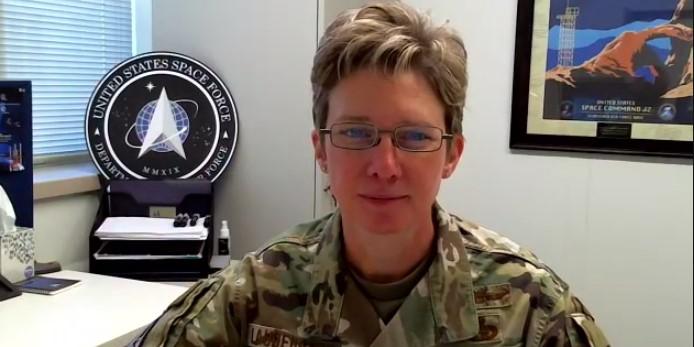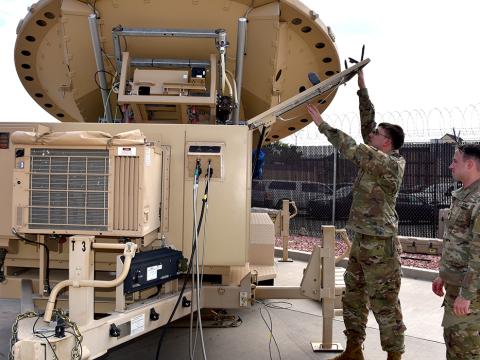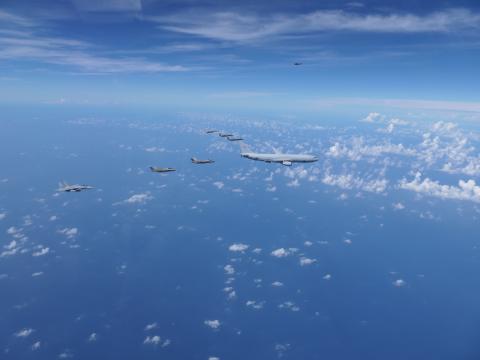IC Membership Is Proving Crucial for Space Force
Similar to other members of the intelligence community, the U.S. Space Force is responsible for advancing intelligence-related mission objectives for U.S. national security. The service is performing space-related intelligence, surveillance and reconnaissance to provide key information and data to the community. Being part of the intelligence community is an important step for the year-old service, said Maj. Gen. Leah Lauderback, USAF, director, Intelligence Surveillance and Reconnaissance (ISR), U.S. Space Force, speaking last Friday at a virtual Mitchell Institute event.
The service has enough of its functionality set up to serve the intelligence community, and the general is already providing weekly space-related intelligence reports directly to Director of National Intelligence (DNI) Avril Haines. The Space Force also is participating in the DNI’s executive committees, deputy executive committees and working groups.
The move into the intelligence community (IC) brings the Space Force on par with the intelligence elements of the other services and the other Defense Department intelligence community organizations—including the Defense Intelligence Agency, the National Security Agency, the National Geospatial-Intelligence Agency and the National Reconnaissance Office—as well as the other federal IC agencies, the general said.
“I don't know that I want [us] to be the dominant [participant], but I do want to be on par with the other services and with the other agencies,” Gen. Lauderback explained. “And I absolutely feel that way today, [that we are on par].”
As the director of ISR at the Space Force headquarters at the Pentagon, Gen. Lauderback is the senior intelligence advisor to Chief of Space Operations Gen. Jay Raymond, USAF. She is responsible for policy formulation, planning, evaluation, oversight and leadership of the Space Force’s ISR. The general has spent the last year standing up the ISR directorate, organizing its activities, structure and personnel.
She discussed the January approval process with former DNI John Ratcliffe—Avril Haines is now in that role under the new administration—that made Space Force the 18th member of the community and the ninth Defense Department intelligence element. “This wasn't something that the IC [intelligence community] does on a regular basis,” Gen. Lauderback noted. “We came together—my staff came together with the DNI staff and we went through the pros and cons, and what do we think this means, what functions do we need to be able to execute in order to become a member of the IC. Then-Director Radcliffe made the decision for us to become a member, and [he] provided me with a memo that says, ‘Here are the things that I need to make sure that you are doing’ and ‘if you aren't doing those things today, what is your plan to be able to get to those things.’ Over the last couple of months, we have been going through this list. And it is extensive because there are a lot of intelligence community directives out there.”
When performing space-related intelligence in support of national security, the Space Force must adhere to certain policies and procedures that include civil liberty, privacy and transparency stipulations. The service had to make sure it is in compliance with the directives and that it is following the appropriate tradecraft to gain intel as intelligence professionals. The service also is working to align its intelligence efforts and related funding from the National Intelligence program or the service.
“We are going to be spending National Intelligence program dollars, and we will be spending Space Force dollars,” Gen. Lauderback shared. “Because we are spending their money to do a national mission, they want to make sure we are spending their money correctly. And looking at these compliance directives, we can say today that we are compliant with all of these, and the reason is because we've been under the Air Force and the Air Force has been compliant when doing these things.”
Additionally, the general is in the process of standing up a National Space Intelligence Center, with the goal of reaching initial operating capability by January 2022. The center will support the service’s role in the intelligence community. “We are really in the throes of standing up the National Space Intelligence Center,” she announced. “I'm excited about this.” The service has a related working group that has been meeting for a number of weeks both internally to the Space Force and externally, to shape the National Space Intelligence Center.
“I'd say our biggest quick win was that we did become a member of the intelligence community,” she noted. “[It is] being a member of the intelligence community and having a voice at the table. The first time I met with the DNI is an example. I talked about how we are able to message more and share intelligence that the American public needs to know as to what is happening, such as unprofessional behavior by the Russians on orbit as an example. So, I think this is a big win for us to be being part of the intelligence community.”





Comments